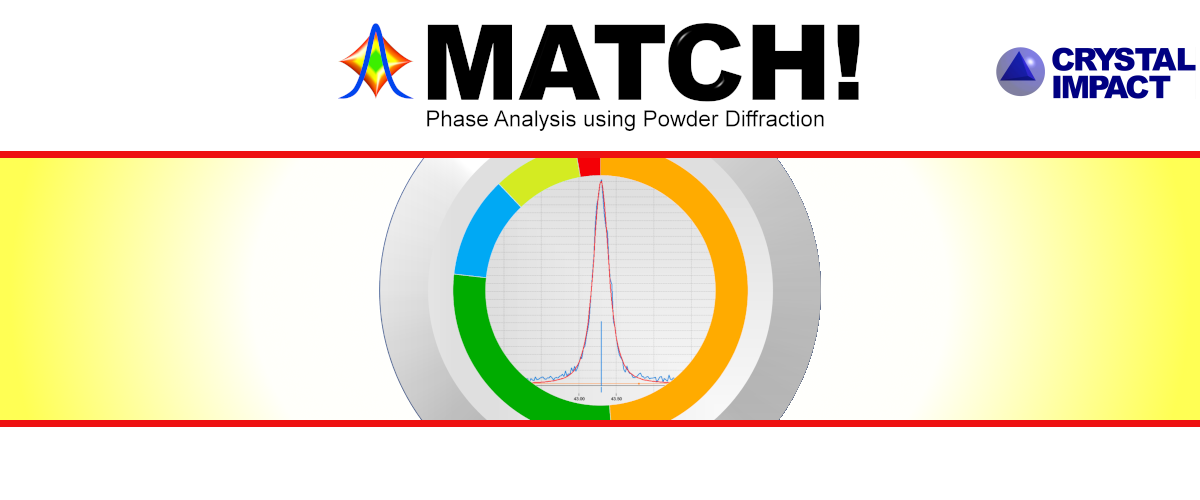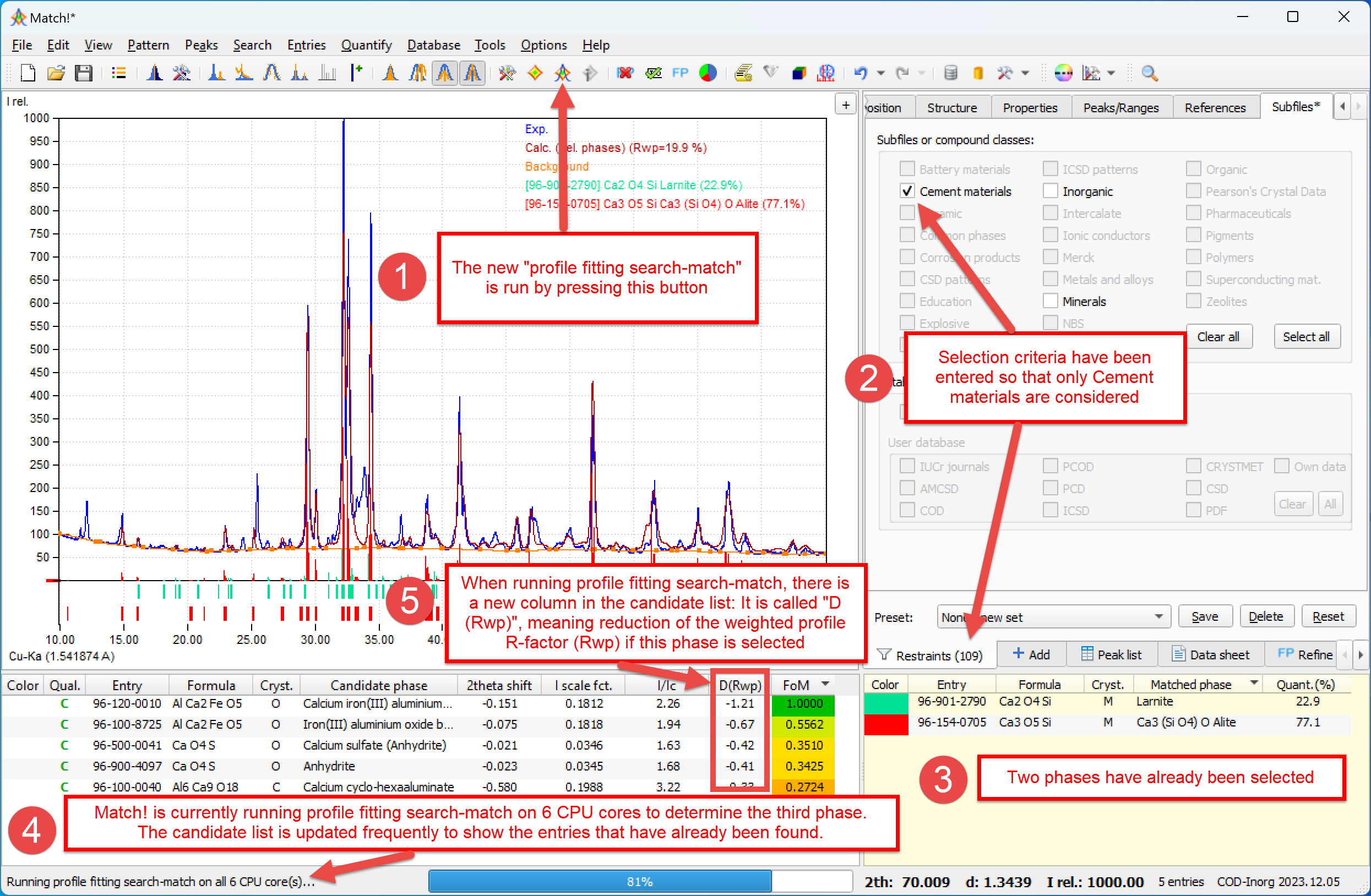Match! version 4 has been released
April 12, 2024
We have just released the new Match! version 4 that provides profile fitting search-match as an alternative to the proven peak-based search-match function for qualitative analysis.
The good news first: All Match! version 3 customers whose update permission time has not expired yet can update to the new version 4 free-of-charge! Hence, if you are a licensed user of the previous version 3, please check your update permission time (e.g. in "Help / About Match!") and then download and install the new version from here.
In addition, everybody can try the new version 4 for two months free-of-charge, even you don't have a license for Match! so far and the previous demo version 3 has already expired! Simply click here to give it a try!
You can watch a video, showing the new Match! version 4 in action:

Here is what's new in version 4:
Profile Fitting Search-Match
The main improvement is the so-called "profile fitting search-match" (PFSM), a powerful, innovative
alternative to the proven peak-based search-match functionality for qualitative phase analysis. The new function fits the profile calculated from each candidate entry of the current reference database (or answer set) to the experimental profile on the fly,
so that the sometimes ambiguous peak searching is no longer required for qualitative phase analysis.
The new feature works without additional software, i.e. no Rietveld software (like FullProf) is required! In fact,
no Rietveld refinement is performed actually, because no structural parameters are refined.
Here is how it works: During profile fitting search-match, Match! calculates a profile pattern for every entry of the reference database (or answer set),
and fits both the intensity scale factor as well as the 2theta shift in order to get an optimum agreement with the experimental profile diffraction pattern.
The candidate entries are ranked according to the Rwp values resulting from the individual fitting calculations, or, to be exact,
to the reduction of the Rwp value D(Rwp) calculated from the selected phases that the corresponding new candidate entry would achieve.
The main advantage of profile fitting search-match (PFSM) is the fact that no peak searching is required, thus avoiding the ambiguities that may arise from this.
Another important advantage (compared to the Rietveld refinement search-match approaches cited below) is that PFSM in Match! can use any conventional peak data reference databases, like the COD, ICDD PDF-2, PDF-4, own diffraction patterns etc. The knowledge of atomic parameters for the candidate phases is not required!
While the success rate of this new approach is definitely higher than the "classical" (peak-based) approach (especially with minor or trace phases),
there is certainly one main drawback: The calculation time is significantly longer. In order to compensate for this
to a certain degree, the profile fitting search-match by default runs in parallel on all available cores of your CPU.
It is also possible to restrict the calcuation to a lower number of CPU cores (or even to a single core), in order to keep your computer more "responsive" for other tasks.
Here is a screenshot of the new version, showing the new profile fitting search-match function in action on a Cement sample:

Further Improvements in Match! 4
In addition to profile fitting search-match, Match! version 4 provides quite a lot of other significant improvements:
- Improved handling of entries without I/Ic value in quantitative RIR analysis, e.g. when using the ICDD PDF-2 database: Missing I/Ic values in the match list can now be calculated from imported crystal structure data (CIF) or entered manually.
- New menu command "Quantify / Rietveld refinement (FullProf)" uses the currently selected schedule (-> Rietveld options) to perform an automatic Rietveld refinement calculation for quantitative analysis.
- New "Quantitative analysis" options "Show quantitative analysis method in pie chart graphics title" and "Automatically switch over to the pie chart graphics after performing a quantitative analysis"
- New menu command "Entries / Automatic entry selection" selects matching phases automatically. The minimum required Rwp reduction (that is also used for automatic selection of entries) can be adjusted in the "PF search-match" section on the "Search-Match" tab of the "Options" window.
- New menu command "Edit / Copy candidate list" copies the current contents of the candidate list at the bottom left into the clipboard, in order to insert it into some other program (e.g. Microsoft Excel).
- New menu command "Edit / Copy match list" copies the current contents of the match list (phases selected as 'matching') at the bottom right into the clipboard, in order to insert it into some other program (e.g. Microsoft Excel).
- Continuous display of already found results during normal (peak-based) search-match
- For macOS there now are separate versions for ARM (Apple Silicon) and Intel processors. This significantly increases the calculation speed on Apple Silicon while at the same time reducing the memory overhead.
- Demo version has new signature, so that the Match! 4 demo version can be run for 60 days even if the Match! 3 demo version has expired.
- An issue causing background control points to be no longer shiftable or removable once they got too close to each other has been resolved.
- A bug affecting the recalculation of the degree-of-crystallinity (DOC) has been fixed.
- Another bug sometimes affecting the peak position accuracy in peak searching has been resolved.
- There was a bug affecting the "1/d"-scaling of the x-axis in the pattern graphics that has been fixed by now.
Match! Demo Version and Information
If you are new to Match! and would like to learn more about it, please
visit the Match! web page.
where you can also download a full-featured (time-limited) demonstration version free-of-charge.
|

